You've probably heard that "you are what you eat." But here's a truth that's even more unsettling: your body responds differently to the same food ...
Red light therapy sounds too good to be true. Shine some light on your skin and suddenly your cells produce more energy, your skin looks younger, your ...
Creatine is one of the most well-researched, evidence-backed supplements on the planet. It doesn't just build muscle (though it does that too). It ...
Most people think of bones as scaffolding: rigid, inert structures that hold you upright and give your muscles something to attach to. A frame. A skeleton. ...
We've been conditioned to think of stress as the enemy: something to avoid, minimize, and eliminate from our lives. But what if this blanket vilification of ...
Every few months, another think piece drops blaming social media for everything from anxiety and depression to political polarization and the collapse of ...
In a world obsessed with material success, career advancement, and personal achievement, we've forgotten the most fundamental truth about raising healthy ...
In a world saturated with conflicting nutritional advice, fad diets, and social media health gurus promising quick fixes, it's refreshing to hear the voice of ...
Before you start worrying about workout splits, protein timing, or the perfect exercise routine, you need to understand something fundamental: your ...
Would you be happy with $1 billion? What if everyone else has $100 billion? The answer reveals something uncomfortable yet profound about human ...
Here's an uncomfortable irony: women exercise less than men, even though they need it more. The data is clear on the need. Almost two-thirds of all ...
There's a philosophical debate that's raged for centuries: Are you your body or your mind? But here's the reality that neuroscience makes crystal ...
1. Dopamine Is Necessary For Survival In a study with rodents that were genetically altered to not produce dopamine, food was placed a body length away and ...
Meta Description: Meditation isn't just about relaxation, research shows it can slow aging at the cellular level, reduce chronic stress, and potentially ...
What if the secret to better mental health, and sharper cognition, isn't found in a prescription bottle, but on your dinner plate? While the ketogenic ...
For decades, we've been told that moderate drinking, particularly red wine, might be good for us. A glass with dinner was considered heart-healthy, even ...
All movement is good for you. Walking, swimming, dancing, yoga, cycling; if you're moving your body instead of sitting on the couch, you're ahead of the ...
Let's be honest: health advice has gotten completely out of control. Between strict exercise programs, exotic supplement stacks, elaborate meal prep, ...
Strong social ties are the best predictor of longevity, yet 57% of Americans report feeling lonely. Discover why relationships are as vital as quitting ...
That colorful box promising a "nutritious start to your day" might be the worst decision you make all morning. Walk down any cereal aisle and you're ...

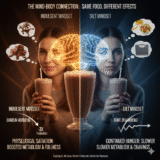

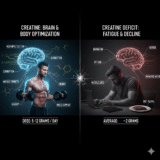
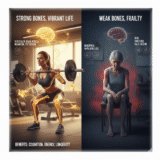
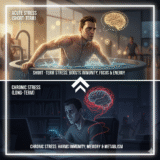



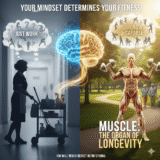
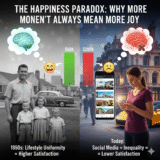
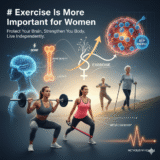
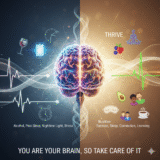
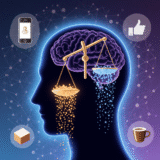

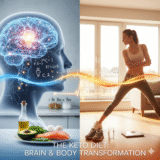
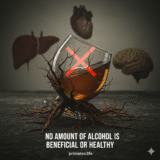
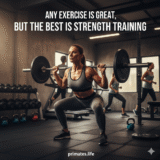


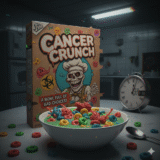
+better adult skills if have breadth of experience vs specializing at a young age?
+multilingual kids have less vocabulary?
+having access to info at time of curiosity improves learning
+ high HRV is a strong indicator of good health
+ can increase HRV by doing deep exhales throughout the day
+ can increase motivation and alertness by doing very brief exercises using large muscle groups
+sleep affects everything from your DNA (harmful genes are more activated) to social trends
+regularity of sleep time is king for health benefits (regularity improves quantity and quality of sleep)
+light exposure and behavior (routines) also help set the circadian rhythm for improved sleep
+poor sleep leads to increased hunger and storing calories as fat
+30 minutes of slow breathing per day reduces fear responses
+5 to 10 minutes improves Brain and mood (is it the breathing or the focus?)
+Magnesium threonate good for brain function as well as sleep
+most people are doing gratitude practice the wrong way – expressing gratitude is only minimally effective; rather, receiving gratitude has more powerful positive results, even if just indirectly experiencing it by witnessing someone else receive it
+a gratitude practice is a very, very potent way
in which you can steer your mental and physical health
in positive directions,
and that those effects are very long lasting.
+Your knowledge that you are making the choice, that it’s you that’s deciding to do something
uncomfortable has been shown to create a very different and positive effect on things like dopamine, on things
like anti-inflammatory markers in your immune system, et cetera, compared to if someone pushes you into
doing it, or because someone insists that you do it and you really, really don’t want to.
+You can’t simply lie to yourself, you can’t simply say, oh, well, every experience is a learning experience, or, you know, a terrible thing that happens, oh, good, I’m just going to say good, and that your body will react as if it’s good for you.
That’s a myth, and frankly, it’s a myth that’s fairly pervasive in the self-help and self-actualization literature.
+the human brain, especially, is so oriented towards story.
We have neural circuits that like to link together past, present, future, have different characters, protagonists and antagonists.
From the time we’re very young until the time we’re very old, story is one of the major ways that we organize information in the brain.
There does seem to be storytelling and story listening circuits in the brain.
+an effective gratitude practice has to be repeated from time to time.
The most effective protocol or tool is going to be either to think into when somebody was thankful for something that you (or someone else) did and really start to think about how you (they) felt in receiving that gratitude.
Or, and, or I should say, imagining or thinking about deeply the emotional experience of somebody else receiving help.
It’s just about what happens to move you.
Now this could be done literally for one minute or two minutes or three minutes.
This is not an extensively long practice.
And that’s very different than a lot of other practices out there.
+If you have a good gratitude practice and you repeat it regularly, you reduce the fear anxiety circuits, you increase the efficacy of the positive emotion, feel good circuits, and the circuits associated with motivation and pursuit are actually enhanced as well.
…the big unlock is you say, that’s great.
Give me 20 other ways to do it that are completely novel, unique, and don’t have anything to do with the first way and put them all on a single page.
And it’s churning, churning, churning, churning.
Three, four minutes later, you have 20 different ways.
Now I click down.
Ooh, that was a weird interaction.
Go down the next one.
Ooh, I like how that kind of zoomed this way and brought it off to the side.
Whoa, no, that’s not going to work.
And you just keep going down and you’re like, well, I like number three and number eight.
Yes.
Give me 10 different ways to do number three and 10 different ways to do number eight.
Yes.
And now you’re getting deeper and deeper and you take a little from here.
We’re going to like, I like the zoom on number three, but I really like the fade on number eight.
And this is the conversation you have with the LLM.
And then by the end of the day, you’re left with something that is truly unique and different.
+15–20 minutes outside during daytime – even in the shade – can be enough to recharge our cells (mitochondria)
+Besides sunlight, the cold and heat, fresh air and movement are healthy benefits of going outside
+Red light panels have proven benefits
+mindset about food affects how the body responds to it (think: healthy, enough)
+Positive thinking about exercise improves results
+Short term stress can be beneficial
+lactic acid from exercise simulates the brain and other organs to rejuvenate
+Brain gets smaller with age, but it can actually grow with exercise, even after 60
+Simple multivitamins are effective
+4000 IU vitamin D is healthy
+Ketosis starts after about 12 hours of fasting, body and brain start to burn fat for energy and produce ketones (which are similar to lactic acid)
+Ketosis is most beneficial for the brain, also for weight loss and longevity
+Intermittent Fasting >15 hours leads to weight loss even if eating the same amount of food
+Omega 3 reduces depression (sleep & exercise also)
+Not enough Omega 3 is the same as having high blood pressure or cardiovascular disease or smoking
+Creatine good for the brain >10 grams, offsets stress and lack of sleep
+You can buy it for pennies over the counter at Amazon
and Costco and CVS and everywhere. It’s a safe antacid. And it turns out we did the clinical
studies in Northwell and we did then laboratory studies in my lab. It’s a pharmacological vagus
nerve stimulator. Famotidine is the generic name that
it’s got a bunch of brand names, including one of them is Pepsid.When Ulf
combined the famotidine with the TENS unit in his ear, he gets a hundred percent overlap. He looks like a
21 year old kid with this overlap between respiratory sinus arrhythmia and heart rate variability
Good for the brain:
+exercise (#1)
+push your brain to look for what’s right, rather than what’s wrong; be optimistic and grateful.
+faith / purpose
+Omega-3 fatty acids, Because it decreases inflammation, and 25% of the cell membranes in your brain are made up of omega-3 fatty acids.
+continuous learning (while exercising)
+sleep (memory consolidation and clears out harmful proteins)
+saunas (increase blood flow?)
Bad for the brain:
+SSRI’s (anti-depressants) 75% increase risk of dementia
+Artificial Sweeteners disrupt the gut biome, reduces nutrients to the brain
+negativity
+consistent loud noise
+https://www.sidehustlenation.com/shrink-the-internet/
+00:26:28 Visual Focus Training can improve mental focus (stare at something for 1-3 minutes)
+00:34:05 Omega-3 (about 300mg of DHA) has positive Attention Effects
+Research shows exposure to varied problems strengthens your ability to solve unfamiliar ones.
+”10,000″ hours of practice for expertise is just an indication of deep focus and effort, it’s not an exact requirement
+improvement requires self-regulatory learning which means basically thinking about your own thinking, taking accountability for your own learning and improvement
+15 minutes per day of sunlight has lots of health benefits, but more time doesn’t have greater benefits
+spending time in the sun reduces mortality & cancer rates
+Hospital Patients near windows recover faster
+Not spending time in the sun has the same mortality & cancer risk as smoking
+Too much sun can lead to some types of skin cancer, but not melanoma
+2000 IU of D reduces all causes of auto immune dysfunctions
+infrared light improves health by boosting mitochondria activity in cells
+Heat helps the body to fight viruses by producing more interferons (up to 39C?); fevers & saunas are good
happiness versus satisfaction.
Happiness is feelings. It’s mostly social. Am I with the people who love me and whom I love back? Satisfaction, on the other hand, is how you feel about your life, your job, your career, conventional aspects. Danny argued people want satisfaction more than happiness.
Rather than pushing people to change, ask why they aren’t doing it already, [and remove obstacles so it’s easier for them to change (pull)]. Want to understand behavior? Look at the situation. When someone acts in ways that don’t make sense, ask yourself, ask yourself, what would the world have to look like for that behavior to make sense?
… our beliefs are formed by people more than facts. We agree with people we like, despite the facts. It’s easier to believe a lie from someone you like than a truth from someone you dislike. We form identity beliefs. Liberal, conservative, Democrat, Republican. They can do no wrong. If they’re wrong, we’re wrong. And we can’t handle that.
+ our brains are wired to be adaptive and to seek out danger, so we seek out problems even when living in relative comfort (first world problems)
+ Rites of Passage are important rituals to prepare the young for future challenges
+ Three-Day Effect: our bodies and minds reset to their natural cycles after just 3 days of camping (without internet)
+ rucking is good, easy exercise and good for losing weight (20 minute walk after eating significantly reduces insulin spikes and improves digestion)
+ loved ones leave a physical neurological imprint on the brain – ‘they will forever be a part of us’; there’s no ‘getting over’ a loss, only getting better at coping with it
+ Mental Oscillation is healthy; suppressing is not
01:15:28 Navigating Grief, Emotions & Body, Tool: Progressive Muscle Relaxation
02:07:46 Mental Oscillation, Dual Model of Bereavement
+eyesight affects alertness, mood, sleep, and appetite
+no amount of regular alcohol is safe, but a little bit occasionally is ok
+Alcohol increases risk of some cancers more than others (breast, liver, kidneys)
+2 glasses per day increases overall cancer risk by 40%
+”Addiction”is something that has negative impacts on life; best way to overcome is by focusing on removing those negative impacts and reaching goals
+good summary of healthy daily habits, but surprised at the lack of discussion about benefits of eating lots of protein
+Everyone can benefit from adopting some of the protocols, but the whole schedule is unrealistic
52:16 Improving Flexibility and Mobility – easy but important foundations for strength
01:53:49 Creatine Benefits and Misconceptions
02:04:29 Is There an Optimal Way to Sleep? – use a flat pillow
+just get started doing some activity, anything is better than doing morning
1:11:47 Are We Losing Meaning and Purpose? – very short sighted – there’s a whole universe to explore; humans never stop inventing/creating; shift to being morally ambitious
+ ‘we should have seen this coming’ – who/how? what could have been done about it? the whole point is that we can’t predict what’s coming, and it’s unrealistic to even try to stop because others won’t stop; what about all the medical and scientific applications?
+Historian and author Rutger Bregman wants us to be morally ambitious, to measure the value of our achievements based on how much good we do, by how much we improve the world.
+binaural beats at low levels can help with learning, focus and relaxation
+Probably not good to use white noise to help babies sleep
(51:05) Building Your Tribe
+2/3 Alzheimer’s cases are women, closely linked with menopause
+Should start hormone therapy at beginning of menopause, 40’s
+4/5 doctors don’t know much about menopause; seriously reconsider any advice to remove ovaries
+Menopause seriously affects brain (negatively)
+Simple Exercise is great, sleep, reduce caffeine/alcohol
+Exercise reduces significantly mortality risk, never too late to start
+There doesn’t seem to be an upper limit to cardio healthiness, i.e. Can always be healthier
+Huge study populations
+Muscle strength directly affects how long & well you live (dementia)
+Technique before intensity/strength
+Irregular sleep reduces melatonin
+Reduced melatonin linked to every disorder & disease, linked to light and darkness
+Internalize goals (prioritize health) by clarifying values
+Creatine: 5g for muscle, 12g for brain
+High protein diet reduces body weight, plus light movement = 48% more weight loss
+protein from mixed meal leads to better synthesis vs vegan
+movement (exercise, esp. resistance) super important for brain & physical health, more muscle = better survivability and health
+Klotho: longevity protein, muscle movement stimulates production; sedentary 30 yo have less than active 70 yo
+Never too late to stimulate stem cell activity in muscle
Starting from: 02:04:36
+Stats for improved health of good sleep vs not
+Don’t (warm) shower before sleep – body needs to cool for sleep
+Can eat protein+complex carbs before sleep if hungry, but don’t do it regularly
+Less sleep leads to desire for unhealthy food
+Less sleep leads to less emotional control
+Less sleep leads to lower cognitive & physical performance
+15 minutes = difference between A & B students
+Can repay sleep debt over several days
+Teenagers do naturally sleep & wake later
+Red light can help improve eye health
+Vitamin d is good
+Omega 3 is good but only from eating fish
+should visit optometrist regularly, even with good eye sight
+Cancer cells eat sugar & glutamine; mitochondria dysfunction/ fermentation
+Cancer not likely genetic; paradigm shift
+no conclusive evidence that microplastics are harmful to people
+EVERYwhere
+high sources: water bottles, soup cans, ‘waterproof’ food containers & cups
+Light is the most important influence on sleep, but also the timing of food and exercise
+Bright light 11pm-4am very bad, even just a short time
+Can encourage earlier sleepiness by turning on the light before waking
+Suncream doesn’t prevent skin cancer, but does prevent damage and aging
+Use mineral sunscreen not organic or chemical
+High protein diet, non-inflammatory foods, fiber improves skin health
+Omega 3 from fish good for skin
+Retinoid, not retinol, in lotions is beneficial
+Laser resurfacing is very effective
+Red light therapy is effective but needs to be high intensity
+D12 is essential for good health and the best source of D12 is sunlight, so don’t use sunscreen if you’re outside for less than 1 hour. take D12 supplements if don’t get enough sunlight.
+ high correlation between oral infections and cancer rates
+ Mouthwash is bad because it kills the good bacteria
+ Fluoride is very bad
+ Tongue scraping is healthy
+ Exercise, while foods, sunlight (limit use of sunscreen)
? Nitric oxide is important for good health, but it’s a byproduct of a healthy lifestyle (mitochondrial function)
? High processed food diets, 58% higher mental health problems
+Keto & fasting meant to to intervention not lifestyle
+Keto and fasting have wide ranging mental and physical benefits
+Low fat diets have no benefits
+strong correlation between low creatine levels in the brain and mental disorders
+creatine only comes from animal food sources, or supplements
+fix lifestyle (sleep, diet, stress, substances, relationships/purpose) before considering supplements
+mouth breathing is very bad for health
+Floss, gentle brushing (keep good bacteria), water pik
+Don’t over brush, and can just spit out toothpaste – don’t need to rinse
+Oil pull (swishing w coconut oil) 3 times per week
+Hydroxyapatite and xylitol toothpaste; flouride has many negative health effects
+Tongue scraping is good
+Small cavities can self heal if the mouth is healthy
+Need at least 2 hours between eating for the mouth to stabilize (water is ok)
+Mouthwash is bad because kills good bacteria
+bones are about 70% hydroxyapatite
+the brain and body don’t know the difference between past and present when reliving a trauma
+It is never effective to try fixing a past trauma, need to learn to recognize it and then move past it
+short term stress (< 4 days) boosts the immune system and increases energy, and also improves cognitive function and learning, but long-term stress is unhealthy
00:10:07 Daytime Stress, Learning & Cortisol
00:21:29 Brief Stressors & Immune System
+50% of women will have bone fracture after menopause, half of those won’t return to previous lifestyle and 30% will die from complications
+Breastfeeding reduces bones by 25%, need to supplement calcium intake
+sleep is most important
+Bone impacting exercise are necessary for building/maintaining density, running jumping resistance
+Can maintain density when older, but need to build when young
+Alzheimer’s is highly correlated with type 2 diabetes
+being ‘prediabetic’ means there’s a 35% chance of developing type 2 diabetes within 10 years, unless SIGNIFICANT lifestyle changes are made
+Age related decline isn’t inevitable until after 70
+Menopausal decline can be offset with lifestyle changes and hormone therapy
+warming up is essential for increasing HGH production during exercise
+weight training over 60 minutes or too intensely is counter-productive for HGH
+heat exposure (sauna @ 26C – 36C) for at about 20 minutes for at least 3 days increases HGH production by 1200% (12x)
00:14:41 Growth Hormone Release, Tools: Sleep & Bedtime Fasting
+Produce HGH in first few hours deep sleep, but only if low blood glucose
00:16:07 Growth Hormone Release, Tool: Meditation
+Similar effects of deep sleep
(2:22) Does not contain an illegal sexual stimulant
+reverse psychology, hidden message
(9:09) 4-hour erection
+reverse psychology, hidden message
(10:56) Operators are standing by –> they’re busy, please keep calling
+reverse psychology, hidden message
(15:17) They’re eating the cats
+draw attention to underlying issue
(21:54) A diamond is forever
+social influence/engineering
Problem
Proposed solution
Proof
Potential benefits
+the most critical thing for early child development is physical time with parents
+The first 3 to 5 years are the most important of any person’s life
+Mothers and fathers have different but equally important roles in child’s development:
13:00 Is the Role of a Mother More Important Than That of a Father?
16:30 Why Are Fathers Important From a Biological Level?
+Women entering the workforce probably had the biggest (negative) effect on global children’s mental health crisis
+Can’t have it all as parents, have to sacrifice time and effort especially in the early years
+when kids become stressed, the most important thing is to first acknowledge their feelings before trying to fix the situation
(20:14) The Importance of a Clear Mission Statement
(38:04) Making the Customer the Hero
(46:49) The Power of Story in Sales
+dopamine: wanting/craving something don’t have (motivation)
+serotonin: bliss/contentment for what already have
+Don’t ignore or wallow
+Be compassionate
+3rd person self talk – what would a good friend or future self say? (self-distancing)
+regrets show a better path forward
VC pitch deck:
; slide number one is what do we do (as if VC knows nothing)
; Slide number two is what do I know about the future that’s not obvious?
; Slide number three is anything impressive that’s happened so far objectively? Customers, patents, letters of intent, just some proof that people in the world care about this thing and that they’re joining the movement and signing up.
+If a VC doesn’t believe your insight, they’re not gonna invest. There’s no way to overcome their objections. They’re not gonna invest no matter what until it’s proven.
What you wanna find is the subset of people in this world who believe what you believe. Only their objections matter. That’s true of customers, it’s true of investors, true of early employees.
Don’t waste any urges of energy on anybody else and their objections.
+all food can be enjoyed in moderation, no crazy diets
+lose weight by eating slower; slower by about 20% reduces calorie intake by about 15%
+Fiber slows glucose absorption & increases nutrient absorption
+Snacking on nuts versus normal snacks equated to a 30% reduction in cardiovascular disease in just 6 weeks
+if you have a really refined carbohydrate breakfast or snack then you’re more likely to have a blood sugar dip which we know from our research is more likely to make you more hungry, eat more calories, have lower mood, have lower energy and be less alert (vs high protein snack)
+eating after 9pm is unhealthy because it disrupts natural circadian rhythm (feel MORE hungry when wake up)
+poor sleep leads to unhealthy eating cravings
+Poor sleep also results in bigger glucose spikes from the same food
+Good sleep leads people to naturally eat less
+No evidence that seed oils are unhealthy, they don’t lead to inflammation
+Food cholesterol (reasonable amounts) doesn’t increase blood cholesterol
+Menopause symptoms can be reduced 30% by healthy eating, good sleep and exercise
+Soy foods reduce menopause symptoms because of estrogen-like compound that binds to oestrogen receptors
+people care more about social issues when they feel economically secure
+be curious easier (more effective) than trying to be interesting/right
+Listen to paraphrase
+Balance Active Listening and Sharing
+mindset change is the necessary first step – believe that physical wellbeing is important and possible; eg. a group of hotel cleaners who were told that their work was exercise had better health vs control group
+muscle is the organ of longevity
+Resistance training only way to get stronger (but don’t need weights)
+”you will never regret being strong”, but feeling like a weak old person is terrible physically, mentally and emotionally
+Muscle & exercise = better health + brain
+Need 1g protein per pound body weight
+Need more protein as age because Muscles less efficient as age
+5 minute thought exercise: imagine your physical health in 15 years, go through a day from wake to sleep, how do you feel, same/weaker/stronger? How well do you move? what activities do you do?
+keto diets can significantly reduce mental disorders like ADHD, depression and anxiety
+positive results from keto can be observed in just a few weeks
+an effective keto diet is, unfortunately, very personalized and requires experimentation, but there are some basics like no or very low carbs, and high protein and fat
+fiber isn’t necessary if eating no/low carbs
+Can’t burn fat unless insulin is low, even if have lots fat in body
? Not good to exercise after eating (increased insulin)?
+Ketones meter: stable insulin not enough
+Never too late to start keto
+exercise improves learning (before learning is best, even short exercise)
+Exercise boosts energy and stimulates the brain directly and indirectly
+Compound exercises especially good because bones release lactate that goes directly to the brain
+All SAFE exercises are beneficial
+Exercise is most important for women because of mental decline from menopause
+Communication, social needs (state recognition of the need, and be a source of it):
;Significance – need to feel important, make a difference
;Approval – did a good job
;Acceptance – feel part of a group, us/we
;Intelligence
;Pity – need recognition for suffering
;Power – control other people
+Novelty and authority are strong influencers
+”Professional” may seem inauthentic/boring
+Cognitive dissonance- start with small commitments
+dopamine is natural and necessary, and it motivates us to seek more resources in a resource limited world, but the problem is that modern life is one of overabundance
+exercise is a great what to get healthy long-term dopamine
+ write for audience of 1 person, and take them on the “hero’s journey”
+ create the structure (table of contents) first, then engage audience during build phase
+ does it transform the reader in a way that they want to talk about with others
+ does it provide a contrarian/different perspective on the current zeitgeist
+ titles are very important (a/b test with audience?)
”
…big milestones, there’ll be two to four
of those typically. …big milestones that help them go from zero to hero. Within each of those
parts, you have these sub steps, right? These little things that they have to do during that major
milestone to ensure that they get there. Or you have questions that they’re going to ask during
those phases. So you take your table of contents, and then you spend a bunch of time talking to
real target readers, showing them your table of contents before you write a word
“
I say, “Here’s my situation.
Ask me the questions that you would need to know
if you were my lawyer.”
So then it asked me the question.
At that point, now it has the context.
Then I say, “Give me an informed answer
based on what I just told you.”
And then it knows, “Well, you could do X,
but since you said you’re incorporated here, blah, blah,
blah,” right?
And it can give you a smarter answer that way.
– Oh, that’s pretty good.
Have you used it for any other prompts
that are helping you solve like just like life problems
where like a therapist would help guide you
or like an executive coach?
– Yeah, I tell it, it’s my coach or it’s my therapist
or it’s my strategist or it’s my analyst.
And then I’ll either ask it the questions
or I’ll tell it to ask me the questions.
By the way, that’s one of the useful things
about ChatGPT is tell it the role upfront.
So the prompt structure that works is role, goal,
and then I think context.
And so you go role, you say, “You are my research assistant.
Your job is to find examples that support
the ideas that I’m gonna present you.
Goal.
I’m trying to write a really persuasive blog post about X.
So I need to come up with great examples
and counter examples.
And then I’ll give it the context.
The context is blah, blah, blah.
And then it knows the role, it knows the goal,
and then it has the context in order to actually do the job.
– Dude, that’s amazing.
I love ChatGPT.